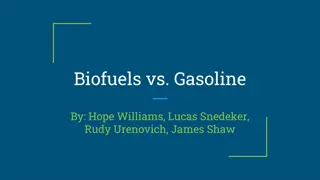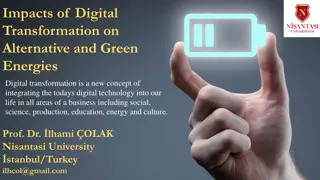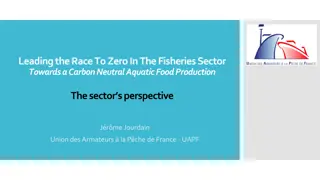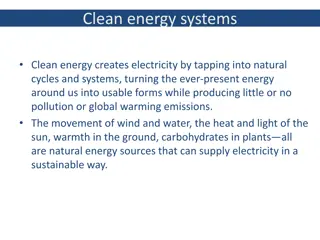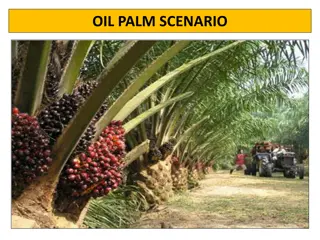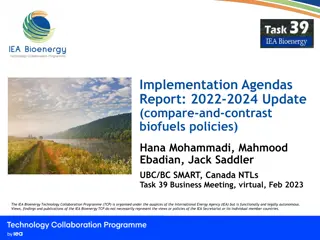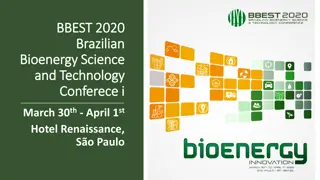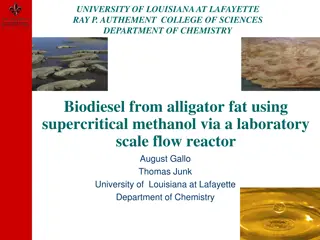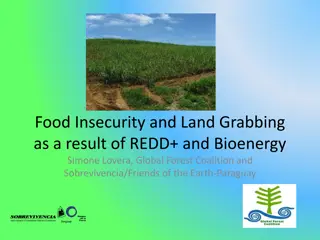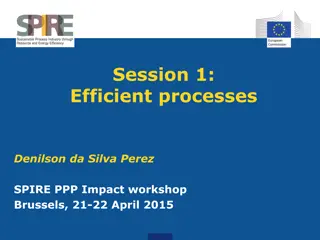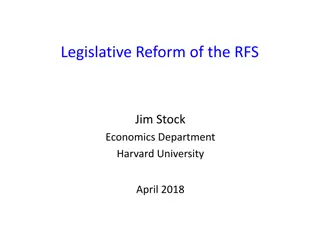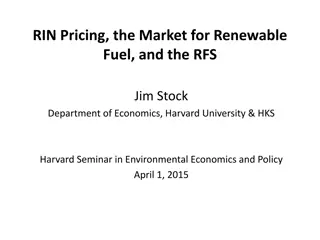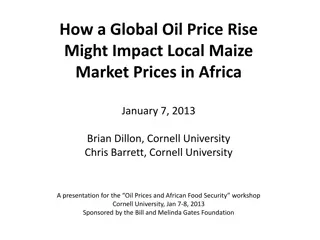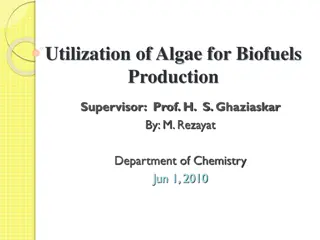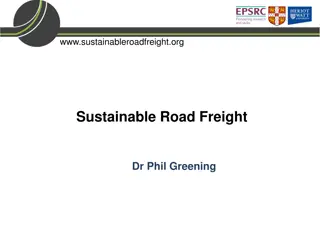Pros and Cons of Biofuels in Comparison to Gasoline
Biofuels, renewable liquid fuels made from biomass, have various environmental and socio-economic benefits over gasoline. They can replace fossil fuels, reduce greenhouse gas emissions, create jobs, boost economies, and utilize common wastes efficiently. However, challenges like production costs, su
1 views • 11 slides
Impacts of Digital Transformation on Alternative and Green Energies
The integration of digital technologies into alternative and green energy systems is transforming the way businesses operate and deliver value. Digitalization enables advancements in data, analytics, and connectivity, leading to improved renewable energy solutions such as solar power, wind power, bi
2 views • 7 slides
Advancing Towards Carbon Neutrality in the EU Fisheries Sector
The EU fisheries sector is making strides towards carbon neutrality, with a focus on reducing greenhouse gas emissions and adopting energy-efficient technologies. Efforts include decreasing CO2 emissions from fishing fleets, implementing regulations for vessel capacity, and exploring innovative equi
0 views • 13 slides
Clean Energy Systems: Harnessing Natural Cycles for Sustainable Electricity Production
Clean energy systems tap into natural energy sources like wind, water, sunlight, and biomass to generate electricity sustainably, reducing pollution and global warming emissions. Transitioning to renewable energy technologies can combat climate change, improve air and water quality, create jobs, and
1 views • 20 slides
Overview of Oil Palm Cultivation: Yield, Climate, and Major Producing Countries
Oil palm cultivation involves species like Elaeis guineensis and Elaeis oleifera with a cropping period of 25-30 years. The plant is known for its high oil yield per unit area and various uses in food, non-food products, and biofuels. Major growing countries include Indonesia, Malaysia, Nigeria, Tha
0 views • 31 slides
Analysis of Biofuel Policies: A Comparative Review 2022-2024
The Implementation Agendas Report of 2022-2024 compares and contrasts biofuel policies, focusing on market-pull and technology-push strategies. Task 39 of IEA Bioenergy assesses member countries' efforts in biofuel sector development. The report seeks to evaluate the effectiveness of policies in pro
0 views • 7 slides
International Bioenergy Science and Technology Conference 2020 Overview
The International Bioenergy Science and Technology Conference 2020 held in São Paulo featured plenary panels on bioenergy innovation, sustainability governance, policies for environmental services, transportation, financing, technology push, and a Biofuture Summit wrap-up. Parallel sessions covered
0 views • 7 slides
Enhanced n-Butanol Production from Lignocellulosic Biomass Hydrolysates
Biofuels production from lignocellulosic biomass offers a promising solution to replace conventional substrates. This study focuses on enhancing n-butanol production using metabolically engineered Clostridium tyrobutyricum immobilized in a fibrous-bed bioreactor. By utilizing agricultural residues l
0 views • 22 slides
European Association of Automotive Suppliers - CLEPA Conference and Industry Overview
Explore insights from the 2nd IRU/EU Road Transport Conference and facts about CLEPA, the European Association of Automotive Suppliers. Discover the member associations and corporate members, along with key statistics on the European automotive industry in 2011. Learn about the shift towards greener
0 views • 10 slides
Biodiesel Production from Alligator Fat: Sustainable Fuel Solution
Biodiesel production from waste alligator fat offers a sustainable solution for energy security and environmental benefits. Louisiana's abundant alligator population provides a source for biofuel production, reducing reliance on fossil fuels. The process involves converting animal fats into biodiese
0 views • 25 slides
Impacts of REDD+ and Bioenergy on Food Security and Land Grabbing
The drivers of forest loss, including demand for wood and land, conflict over land tenure, urbanization, industrialization, corruption, and climate change, are explored in relation to food insecurity and land grabbing caused by initiatives like REDD+ and bioenergy. Increasing competition for land be
0 views • 14 slides
Technological Impact in Biomass Processing for Renewable Resources
This content highlights the technological impact and processes involved in efficiently utilizing biomass for renewable resources. It discusses innovative methodologies to upgrade diverse biomasses for chemicals production, bioenergy, and biofuels. The development of advanced technological solutions,
0 views • 22 slides
Legislative Reform of the Renewable Fuel Standard Act
Brief history of biofuels policy, problems with the Renewable Fuel Standard (RFS), elements of a legislative RFS reform package, policy driving biofuels production, and three reasons to reform the RFS due to high and volatile RIN prices, declining demand for corn ethanol, and slow market penetration
0 views • 17 slides
Biofuels Industry Overview and Outlook Analysis
Ethanol production has rebounded to pre-COVID levels, driven by increased gas consumption and strong exports projected through the first quarter of 2022. Margins in ethanol have significantly improved, with nearby curve margins at breakeven levels. Supply of lease cars is tight and costs are rising.
0 views • 9 slides
Anaerobic Fermentation for Biofuel Production: Uses and Applications
Anaerobic fermentation is a key process converting biomass into biogas without oxygen. Biofuels, such as bioethanol and biodiesel, derived from biomass like agricultural and industrial waste, offer renewable and environmentally friendly energy alternatives. The applications of anaerobic fermentation
0 views • 11 slides
RIN Pricing, Market Dynamics, and Policy Issues in Renewable Fuel Sector
The article discusses the Renewable Fuel Standard (RFS), Renewable Identification Numbers (RINs), RIN pricing fundamentals, pass-through effects, and policy implications in the renewable fuel market. It delves into legislative context, fuel categories, biofuels expansion, and a dynamic model of the
0 views • 37 slides
Impact of Global Oil Price Rise on Local Maize Market Prices in Africa
The presentation discusses the potential impact of a rise in global oil prices on local maize market prices in Africa, focusing on the interconnected factors such as transport costs, biofuels, and price transmission within and between countries. It explores the correlation between global oil prices
1 views • 27 slides
Utilization of Algae for Biofuels Production: A Comprehensive Overview
Algae, both microalgae and macroalgae, hold immense potential as sources of biofuels due to their high productivity and adaptability. Microalgae, in particular, are highlighted for their rapid growth rates and efficient photosynthesis, making them ideal for mass production with minimal land and wate
0 views • 31 slides
Important Information on Alabama EPA UST Regulations: Deadline and Testing Requirements
Alabama Tool Seminars are scheduled in various locations to discuss the new EPA UST regulations that came into effect in 2017. Owners of USTs storing specific biofuels must comply with compatibility requirements, conduct necessary testing by October 13, 2018, and ensure their systems meet the revise
0 views • 16 slides
Sustainable Alternatives to Air Travel for Climate-conscious Travelers
Professor Alice Larkin from the University of Manchester discusses alternatives to air travel, emphasizing the impact on climate change. She addresses options such as rail, road, ferry, and virtual meetings within and outside the UK, along with insights on sea travel and decarbonizing ships through
0 views • 11 slides
Comparing Different Types of Car Technologies for Environmental Impact
Exploring the environmental impact of various car technologies including biofuels, fossil fuels, electric cars, hybrids, and fuel cells. Each technology has its own advantages and challenges in terms of energy efficiency, emissions, cost, and infrastructure requirements. Biofuels offer a renewable e
0 views • 6 slides
Sustainable Solutions for Reducing CO2 Emissions in Road Freight Industry
Sustainable Road Freight initiative by Dr. Phil Greening focuses on technologies to reduce fuel consumption and CO2 emissions, logistics measures for efficiency, and a decarbonization pathway for the UK's transport sector. The strategies include using biofuels, electrification, efficient vehicle tec
0 views • 4 slides
